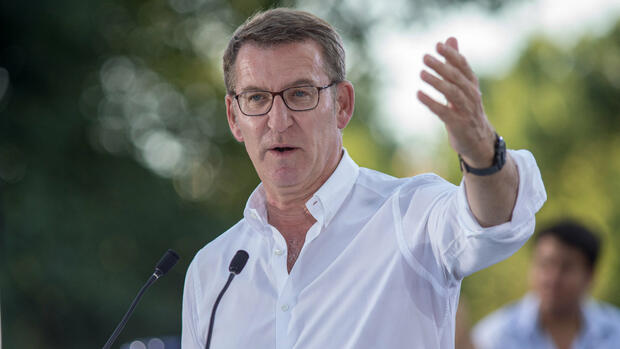Alberto Nuñez Feijoo, leader of the conservative People’s Party (PP) and candidate for the presidency of the government.
(Photo: dpa)
Madrid In Spain, the parliamentary elections, which are also being followed with great interest internationally, have begun, which, according to polls, are likely to bring a shift to the right. Polling stations across the country opened at 9 a.m. A total of 37.4 million Spaniards can vote on the two chambers of parliament – the House of Representatives and the Senate.
According to surveys, the socialist Prime Minister Pedro Sanchez, who has been in power since 2019, must expect to be replaced. The conservative People’s Party of his challenger Alberto Nuñez Feijoo is ahead in the polls. For an absolute majority in the 350-seat House of Representatives, however, Feijoo is likely to depend on the votes of the right-wing populist party Vox.
This wants to expel illegal immigrant migrants and, among other things, repeal laws on transgender rights, abortion and animal rights. In addition, the party led by Basque politician Santiago Abascal wants to roll back the climate protection measures promoted by Sanchez.
Spanish People’s Party can hope for up to 151 mandates
The elections come at a tricky political time when Spain has just taken over the six-monthly rotating EU presidency. The European Union is currently working on a reform of the budget and debt rules.
According to pollsters, the Spanish People’s Party can hope for 131 to 151 mandates. A series of polls show that Vox should win enough seats to give a right-wing coalition an outright majority. At least 176 mandates are required for this. However, according to some pollsters, PP and Vox could also stay just below this mark.
According to the polls, Sanchez’s socialist PSOE only has 98 to 115 seats. Vox is practically neck and neck with Sumar, a new coalition of leftist groups. According to the polls, Sumar would get between 25 and 39 seats. That would not be enough for a left-wing majority.
The ballot was originally scheduled for December. But Prime Minister Sanchez called new elections after the left suffered a defeat in regional elections in May.
More: Pedro Sánchez lost a lot of trust
